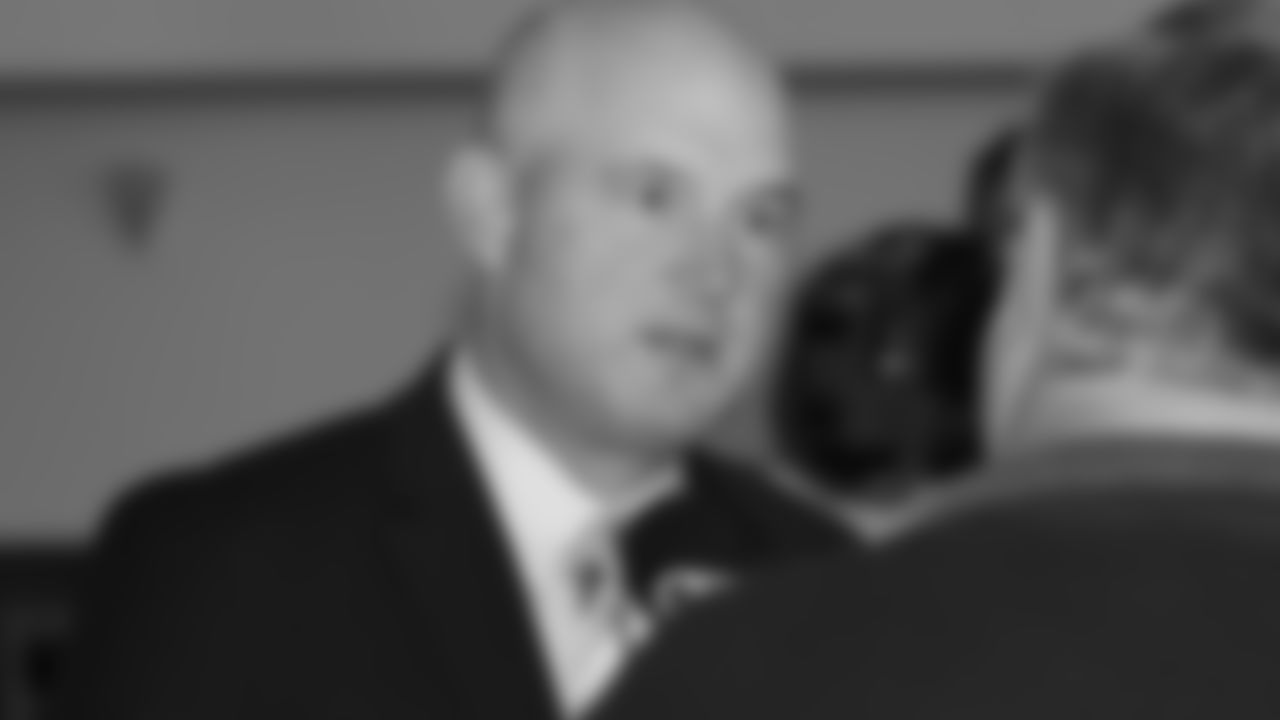Mike Brown, who steered the Bengals to Cincinnati when he diverted Paul Brown's gaze from Seattle and then 30 years later kept them on the river when other cities tried to divert them to their stadiums, isn't one to dwell on legacies.
That's a pretty good one, but during the Bengals president's methodical march to age 84 next month on the day of the pre-season opener in Kansas City, his attention has always been on the next practice, the next game, the next roster move.
What he's looking for more than anything is another Super Bowl run and on Tuesday he showed up with his new 36-year-old head coach, a fresh-faced tag-team partner named Zac Taylor that has him looking at things just a little bit differently these days.
"No matter how old you get -- and I'm pretty old -- you always are exposed to new things. The new staff does have different ways," said Brown during the annual training camp media luncheon, his 52nd of these things. "They meet differently, they practice differently, they emphasize different things. They have a totally new and different way to call plays. It is stunning to me how different all this is, and maybe that's a good thing for us to have this jolt. It'll energize the people in the building from me down to whoever hands out the socks and jocks. We're all asked to do it a little bit differently."
Mike Brown hasn't handed out socks and jocks since he was a pre-teen at Paul Brown's Bowling Green training camp for the Cleveland Browns in the late 1940s. Now at the dawn of the 2020s, Brown and Taylor are crafting a laundry list they hope gets the decade roaring. It starts, of course, with offense. Paul and Mike Brown have always been offense guys. Just look at the coaching roster. The only time there have been defensive head coaches for the Bengals have been in the 19 previous seasons of the 21st century.
"What I like about it most is we are going to have a head coach who calls the signals. I find that a good thing," Brown said. "I am anxious to see what it means for us."
View some of the best images from Bengals President Mike Brown, Director of Player Personnel Duke Tobin, Head Coach Zac Taylor, Defensive Coordinator Lou Anarumo, Offensive Coordinator Brian Callahan and Special Teams Coordinator Darrin Simmons as they meet with the media before the start of training camp.

Mike Brown, owner of the Cincinnati Bengals NFL football team, speaks while being interviewed at Paul Brown Stadium during the team's media luncheon, Tuesday, July 23, 2019, in Cincinnati. (AP Photo/John Minchillo)

Bengals President Mike Brown answers questions from media members as he is interviewed at Paul Brown Stadium during the team's media luncheon.

Bengals Director of Player Personnel Duke Tobin answers questions from media members as he is interviewed at Paul Brown Stadium during the team's media luncheon.

Mike Brown, owner of the Cincinnati Bengals NFL football team, speaks while being interviewed at Paul Brown Stadium during the team's media luncheon, Tuesday, July 23, 2019, in Cincinnati. (AP Photo/John Minchillo)

Bengals Head Coach Zac Taylor smiles as he meets with reporters at Paul Brown Stadium during the team's media luncheon.

Hall of Famer and Bengals television broadcaster Anthony Munoz is interviewed at the team's media luncheon from Paul Brown Stadium.

Andy Olds, who last season retired after 21 seasons (1998-2018) as head football coach at Kings High School, was named as the 2018 season winner of the Paul Brown Excellence in Coaching Award.

Mike Brown, owner of the Cincinnati Bengals NFL football team, speaks while being interviewed at Paul Brown Stadium during the team's media luncheon, Tuesday, July 23, 2019, in Cincinnati. (AP Photo/John Minchillo)

Bengals Offensive Coordinator Brian Callahan is interviewed at Paul Brown Stadium during the team's media luncheon.

Bengals President Mike Brown gives his remarks before announcing Andy Olds as the 2018 season winner of the Paul Brown Excellence in Coaching Award.

Bengals Defensive Coordinator Lou Anarumo gives a radio interview at the team's media luncheon from Paul Brown Stadium.

Bengals President Mike Brown (left) congratulates Andy Olds (right) after he was named the 2018 season winner of the Paul Brown Excellence in Coaching Award.

Bengals Special Teams Coordinator Darrin Simmons answers questions from media members as he is interviewed at Paul Brown Stadium during the team's media luncheon.

Bengals Defensive Coordinator Lou Anarumo listens to questions from media members as he is interviewed at Paul Brown Stadium during the team's media luncheon.

Mike Brown, owner of the Cincinnati Bengals NFL football team, speaks while being interviewed at Paul Brown Stadium during the team's media luncheon, Tuesday, July 23, 2019, in Cincinnati. (AP Photo/John Minchillo)

Mike Brown, owner of the Cincinnati Bengals NFL football team, speaks while being interviewed at Paul Brown Stadium during the team's media luncheon, Tuesday, July 23, 2019, in Cincinnati. (AP Photo/John Minchillo)

Bengals Director of Player Personnel Duke Tobin gives a radio interview about the 2019 season during the team's media luncheon.
Brown thinks Taylor has already lit a fire. Asked what he sees that makes him more comfortable about the February hire, Brown ticked them off for the gaggle of scribes huddled around a table.
"A lot of things. He's very composed, he's a very bright young man, he loves what he does," Brown said. "He works hard. He loves ideas. He can present them in a way that works. People accept what he says. He's confident. I think he's a good package and that it will have a good result."
Special teams coordinator Darrin Simmons, the last man standing from Marvin Lewis' staff in 2003 that also energized the fan base, has sensed a familiar vibe.
"I feel very similar to 2003," Simmons said. "I felt like this place really needed an injection of stimulation. That's the way I feel downstairs now. That's how I feel the players are excited stimulated and I think that's a natural thing with change."

Like Brown said, a lot is different. He should know. He let Taylor hire the biggest coaching staff in Bengals history and Simmons has watched Taylor take it to a different place.
"It spreads things out. Gives it more detail," Simmons said of the extended staff. "We've done more situational football in the offseason than we did before the regular season. I think that's important. Our guys are going to be very in tune situationally with what to do."
Brown has an idea that Taylor is bringing back the kind of training camp he likes, the kind his father had and the kind that has evolved over the last decade. Not a lot of hitting or standing around. Keep them fresh. T.J. Houshmandzadeh was born 15 years early. Run the plays fast and get off the field in under two hours. Brown is certainly right about the hitting.
"There's no Oklahoma Drill. There's no half-line drill. There's no bull in the ring. Those are things that are no longer existent," Taylor said. "I've done half-line drills since I've been in the league. Not recently to be honest with you. And some teams still do it, so it affects a couple teams. But it's not something that directly affects our plans."
That's a no-hitter compared to some of those early Marvin camps and all of Forrest Gregg's 20 years before that.
"The schedule is different," Simmons said. "They're going to have more down time than they're used to. I wouldn't say we're going to work smartly, but we're going to work efficiently."
And it's just not the daily schedules that are different. So are the West Coast travel itineraries, which is notable since the Bengals open in Seattle Sept. 6. They also go to Oakland for a Nov. 17 game. But after coaching with the Rams for two years in Los Angeles, Taylor has the Bengals leaving the day before the game instead of two.
"Even though the kickoff there is at 1 o'clock, it feels like 4 o'clock to us, which really isn't that significant," Taylor said. "It's really the other way around when they travel the other way that it feels like an early morning game and it's important to get out there two days in advance. I saw plenty of teams come east to west and the Eagles beat us two years in a row on a one-day schedule. I've seen plenty of teams come out two days early and be really sluggish because it breaks their routine."
More changes? The one Brown really wants to see? The Bengals last Super Bowl coach, Sam Wyche, called a lot of his own plays. He preferred to call it "an eruption of ideas," from his staff and while he doesn't want to take all the credit for the calls yet to be made, Taylor believes it's important to take ownership.
"I know what I want this thing to look like," Taylor said. "And (offensive coordinator) Brian Callahan and I are lockstep. We are on the same page along with all the other coaches on this offense. It's a little bit easier to show the way initially."
It turns out Taylor is learning from Brown, too. They meet every day, usually with other members of management. But the two constants are Taylor and Brown.
"To have Mike, someone who's been around as long as anybody, teach you that information has really been a cool experience for me," Taylor said of his crash course in NFL history.

"I hear Mike talking often about the taxi squad, meaning the practice squad," Taylor said. "To learn that it really came from the Browns in the '40s when (Arthur "Mickey" McBride) was the owner, and he actually had a taxi squad. The players that had gotten cut were actually taxi cab drivers. And when Paul Brown had an injury and he wanted a player to come, he'd go over to the taxi station and grab one of his players. It truly was the taxi squad. Throughout my career in Miami and L.A. you hear about the taxi squad and you think it's kind of a term that's over used. But to actually know the history of it is kind of cool."
Mike Brown says he's getting old. He wants to keep the schedule at 16 games and laughs at the ludicrous suggestion of expanding it to 18 games while every player has a cap at 16.
"I just don't think we want to play Boston unless (Tom) Brady isn't playing," said Brown, unable to keep a straight face. "Everyone knows the discussion on this. It isn't the way football has been played."
But the jolt of a new coach and the whiff of another training camp can make any football guy young again.
"Different people see that differently. It's probably multi-faceted," Brown said of the legacy question. "I wish we had won more games. That will forever be something that disappoints me, but I have to accept it is where it is. I hope that I will have enough time to see a spurt here that will be enough to energize our fan base. Get them excited. We know we have to reach out to them to get them to buy in and get them back with us. We disappointed them. You can't do that as often as we have done. We are paying a price for that. We have to turn it around. If that happens, I'll leave the stage feeling fulfilled."















